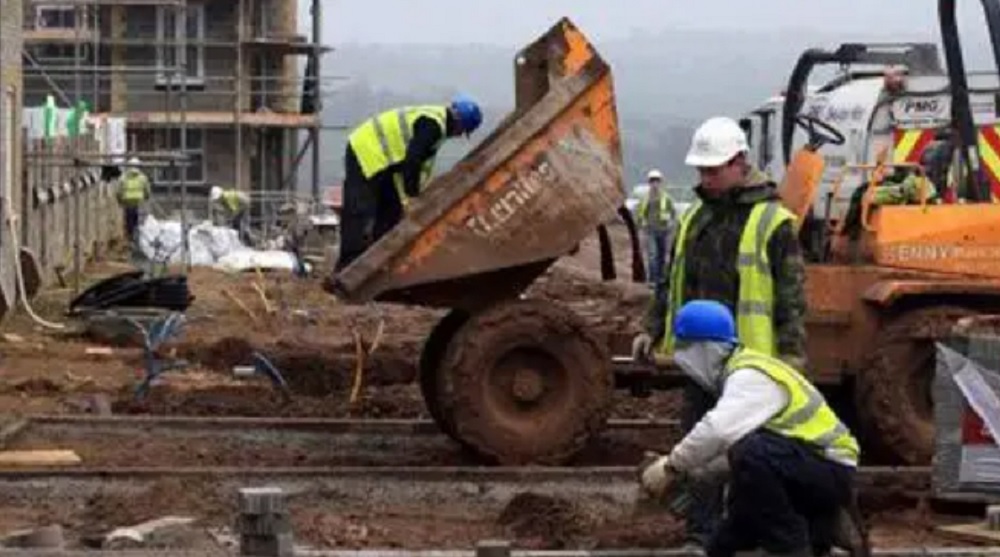News
Japa: Shortage of bricklayers, roofers, carpenters hits UK

The United Kingdom, UK is grappling with a shortage of bricklayers and other construction workers, causing prolonged delays for homeowners seeking building services.
Since 2021, a staggering 415,000 people have experienced over a year-long wait to secure a builder, according to a national construction audit by Fix Radio.
The shortage extends beyond builders, with 301,000 households waiting a year for plumbers and heating engineers, 294,000 for roofers, and 274,000 for carpenters.
On average, the wait for a bricklayer over the past three years has exceeded three months, while landscapers, painters, and decorators have left customers waiting for two and a half months, per report from Daily Mail UK.
Industry experts highlight the severe impact of this skills shortage on major projects, including delays in completing the Co-op Live venue in Manchester.
To meet rising demand, an additional 225,000 skilled workers are to be needed by 2027 with economic repercussions significant as the UK is projected to miss out on £98 billion of growth by 2030 due to the skills gap.
The ageing workforce exacerbates the issue, with a fifth of construction workers now over 50 and a third planning to retire by 2030.
The Construction Industry Training Board’s Construction Skills Network estimates nearly one million tradespeople will retire in the next decade.
While migrant labour has somewhat mitigated the shortages, there is an urgent need to train more British workers.
Last year, bricklayers, plasterers, roofers, and carpenters were added to the Home Office’s shortage occupation list to address the deficit.
UK government initiatives aim to alleviate the problem, including cracking down on non-vocational university degrees and funding 100,000 apprenticeships. Both Labour and Conservative parties have focused on construction in their General Election campaigns, with Labour proposing new towns and Rishi Sunak promising to build hundreds of thousands of homes in major cities.
Clive Holland of Fix Radio emphasized the critical need for more builders, warning, “If political parties, irrespective of their stripe or colour, honestly believe they can address the housing crisis without having the serious conversation of addressing the skills deficit, we’re heading into a very dangerous position.”
A Fix Radio survey revealed that two-thirds of Britons felt insufficiently encouraged to pursue trades in school, and 18% of parents discouraged their children from entering the construction industry due to perceived low earnings.
News
A Chat with Janet Odio Okolo: A Mother’s Journey Raising a Child with Down Syndrome

News
Hon. Nnamchi Begins Street Lights Deployment In Isi Uzo(Photos)

Honourable Paul Sunday Nnamchi, representing Enugu East/Isi Uzo Federal Constituency in the 10th House of Representatives, has fulfilled his promise to illuminate communities in Isi Uzo Local Government Area.
The lawmaker has just begun the deployment of high-density solar-powered street lights in Ikem Nkwo, marking the beginning of a massive rollout of the street lamps across the communities in Isi Uzo.
This initiative, which started in Enugu East Local Government Area in 2024, aims to support the fight against insecurity in the state which according to him was to add to what Chief Security Officer of Enugu State Barrister Peter Mba had done to secure the state to attracts foreign investments.
The lawmaker expressed concern over banditry attacks, particularly by herdsmen, in some communities within Isi Uzo and Enugu East Local Government Areas in the recent pasts.
He believes that illuminating these areas with high-density street lights would help address the insecurity adding that he was prioritizing border and farming communities in Isi Uzo, where banditry has displaced residents and restricted farming activities.
Communities in Ikem, Eha-Amufu in Isi Uzo which borders Enugu and Benue State and Ugwogo-Nike in Enugu East have been vulnerable to these attacks due to their strategic locations.
News
May Day: Kalu Hails Workers, Applauds Their Role in Nation Building

By Gloria Ikibah
Deputy Speaker of the House of Representatives, Rep. Benjamin Kalu, has extended warm wishes to Nigerian workers as the country marks the 2025 edition of International Workers’ Day.
Kalu praised workers across various sectors for their commitment and resilience, describing them as the engine that keeps the nation moving. He acknowledged their sacrifices and unrelenting drive, especially during tough economic times.
In his message, he highlighted the efforts of the current administration under President Bola Tinubu to improve the welfare of public servants. He referenced the National Assembly’s prompt backing of the new minimum wage as a sign of the government’s seriousness about workers’ wellbeing.
The Deputy Speaker appealed for continued patience and understanding from Nigerians, noting that the ongoing economic reforms, while challenging, are designed to bring long-term relief and prosperity.
Kalu also called for unity, and said the country can only overcome its present difficulties if citizens and leaders work together in good faith.
He therefore urged workers to keep the faith and remain steadfast in their duties, assuring them that brighter days are on the horizon, and wished Nigerian workers a peaceful and fulfilling May Day celebration.
-

 Metro18 hours ago
Metro18 hours agoGunmen storm University of Benin teaching hospital, kill doctor
-

 Metro18 hours ago
Metro18 hours agoFCTA destroys 601 motorbikes over violations
-

 News9 hours ago
News9 hours agoAlleged money laundering: EFCC produces Aisha Achimugu in court
-

 News18 hours ago
News18 hours agoJust in: FG declares tomorrow public holiday
-

 News11 hours ago
News11 hours agoJUST IN: Major General Paul Ufuoma Omu Rtd, dies at 84
-

 News11 hours ago
News11 hours agoTinubu hails Dangote’s World Bank appointment
-

 News14 hours ago
News14 hours agoSAD! Professor’s son takes own life inside varsity staff quarters
-

 News18 hours ago
News18 hours agoFull list: FG approves N110bn to rehabilitate medical schools 18 institutions











